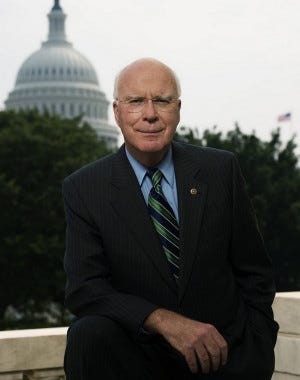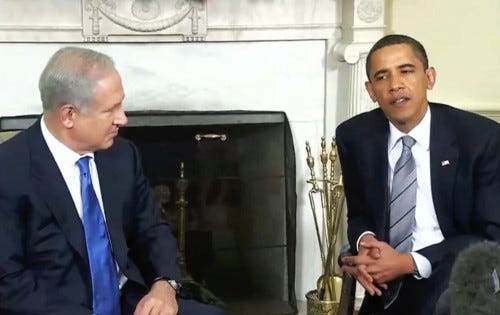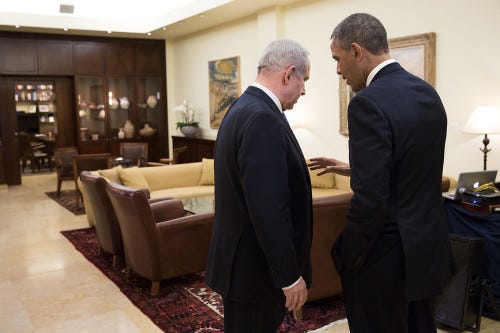Leahy Netanyahu Conflict Shows Change in Israel’s Image in US
This article first appeared on mondoweiss on April 7.
For years, the US-Israeli relationship has been calcifying into a bipartisan weapons patronage from the former to the latter. War crimes and abuses Israel has committed on the Palestinian people have been condoned and protected by the US.
For the past three decades, activists have held out hope for the moment when the pendulum of US support for Israel began to swing in the other direction. In the contentious and volatile election year of 2016, that moment may have finally come.
On September 22, 2015, Israeli police killed a young Palestinian, Hadeel al-Hashlamoun, at an Israeli checkpoint. The brutal murder has now become the center of a political firestorm between the US and Israel.
[V]ermont Senator Patrick Leahy penned a public letter on March 30 to Secretary of State John Kerry about the killing. In the letter, he reminded the Secretary of State that his office must determine the credibility of the documented accusations of human rights violations in Israel.
Leahy is intimately familiar with the law, having authored it and lent his name to it. The Leahy Law provides for strict penalties for the US if it is found to be providing weapons to states engaged in gross human rights violations.
The letter’s public content predictably incurred the wrath of Israeli Prime Minister Benjamin Netanyahu. Netanyahu released a statement hitting back at Leahy, curtly stating that Israeli Defense Forces and Police use “the highest moral standards against bloodthirsty terrorists who come to murder them.”
[E]ven if the Obama State Department launches a probe into these allegations, it will likely find that Israel is not guilty of human rights violations. Things haven’t changed that much. But what matters here is that the public conversation surrounding Israel in the US is changing, and that that change is bringing a reconsideration of the US-Israeli relationship.
The blame (or credit) for this reconsideration can be laid at the feet of the Netanyahu government. From the early days of the Obama administration, the Israeli Prime Minister has been an antagonistic thorn in his side.
In March of 2010, days in advance of a state visit by Vice-President Joe Biden, the Israeli government announced the construction of 1,600 new units in settlements in East Jerusalem. The move was a blatant slap in the face to the Obama administration.
Tensions were raised so much after that moment that Netanyahu openly campaigned against Obama’s re-election in 2012 and against the Iranian nuclear deal in 2015 (not enough to prevent Obama’s administration from delivering record-breaking amounts of military hardware to Netanyahu’s government).
The upshot of Netanyahu’s anti-Obama activism has been the politicization of the US- Israeli relationship to a point unheard of recent memory. Netanyahu’s petulant behavior towards the leader of the country upon which his relies for survival has drawn a line in American politics on Israel. Democrats are now more open to critiquing the actions of the Middle-Eastern nation, while Republicans (with one notable exception) are increasingly in lock step in their support of Israel.
Now that the issue has become a partisan football, instead of the universal foreign policy principle it used to be, a shift in American political culture on the question of Israel is accelerating.
[A] decade ago, it would have been unthinkable that the front-runner of the Republican Party would publicly promise to be an impartial arbiter between Israel and Palestine. It would boggle the mind that a serious contender for the Democratic nomination would debate the New York Daily News editorial board on the merits of the 2014 war on Gaza. And it would be completely out of the question that a movement like the Boycott, Divestment, and Sanctions movement would not only be newsworthy, but a topic of discussion on the campaign trail. But here we are.
This political change has culminated with Leahy’s challenge to the dominant narrative of Israel’s military purity and the Palestinians as bad actors. The very act of disrupting the hegemonic idea of Palestinians as oppressors and Israelis as the oppressed is an act indicative of the new stakes in US- Israeli diplomacy.
In this context, Leahy’s letter to the State Department can be seen as the first step in a new path forward in US-Israeli relations, one where the zealous and blinkered support for the Middle Eastern regime aligns with the Republicans and opposition aligns with the Democrats.






